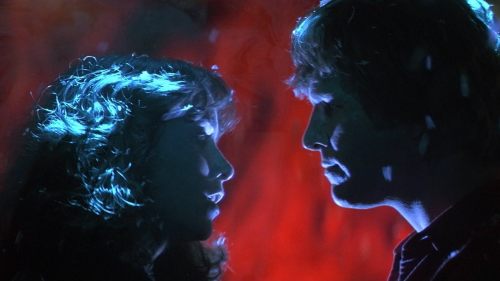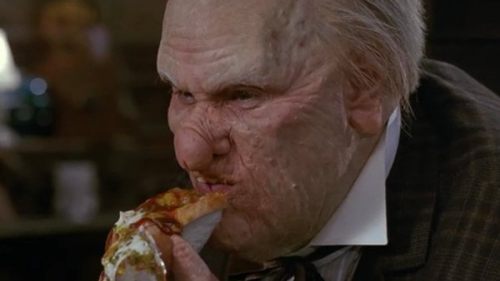FLETCH Would Be Perfect As A Podcast
Clark Griswold, Ty Webb, Dusty Bottoms, Irwin ‘Fletch’ Fletcher.
The fact that Chevy Chase managed to carve out a place in comedy history by playing beloved characters all while being a gigantic asshole in real life is truly inspiring. It’s proof that you can have your cake, eat it too, AND get into a fistfight with Bill Murray if you just work hard enough on your pratfalls.
Chase’s legendary bad behavior has been chronicled plenty - online, in interviews, and in books like the excellent WILD AND CRAZY GUYS by Nick de Semlyen. Chase is a larger than life personality whose antics have miraculously never managed to eclipse his work as an actor in the public eye. While Chase may not be a box office draw anymore, the streak of hits he had during the early ‘80s have not been soured in the public consciousness and his films will still be remembered by those that inherit the earth, such as the Morlocks as they pop in a DVD copy of SPIES LIKE US to watch while eating roasted Eloi.
But I come to bury Chevy Chase, not to praise him.
If your knowledge of FLETCH goes no further than the two films Chase starred in, A) you have unfortunately watched a pretty bad sequel and B) you’re missing out on one of the best series of mystery books around. FLETCH might be better known as an ‘80s comedy but the books are, as usual, better.
Irwin Maurice Fletcher - I.M. Fletcher, or Fletch for short - is a bumbling yet cocky master of disguise as played by Chevy Chase in the 1985 film FLETCH and its 1989 sequel FLETCH LIVES. Known for outlandish aliases, goofy false teeth, and questionable accents, Chase’s Fletch is just another opportunity for the actor to practice some character bits in between wooing attractive women and sticking it to “the man” - nevermind the fact that few comedy actors have more closely resembled “the man” than Chevy Chase.
The character, while funny, is a defanged goofball shadow of creator Gregory Mcdonald’s literary alter ego. A former Boston Globe journalist, Mcdonald published FLETCH in 1974. Born in Massachusettes and educated at Harvard, the yacht-sailing former teacher had his first brush with Hollywood two years earlier when his 1964 novel RUNNING SCARED was turned into a film starring Robert Powell. Before agreeing to let Chase play the role, Mcdonald would use his contractual veto power to deny both Burt Reynolds and Mick Jagger the opportunity to star in an adaptation of his novel
Mcdonald quit journalism after FLETCH was published and won the Best First Novel from the Mystery Writers of America’s Edgar Awards. Between 1974 and 1985, Mcdonald published six sequels featuring his signature character. Two prequels would be published around the same time Chase’s comedy was released in theaters and then Mcdonald would return to the character for two additional books that followed Fletch and his adult son Jack in 1993. Altogether, the FLETCH series would consist of eleven books, plus four spin-offs that featured Investigator Francis Xavier Flynn, an Irish born, German raised spy-turned-cop introduced as a foil to Fletch in 1976’s CONFESS, FLETCH.
So much of Fletch is clearly a reflection on Mcdonald’s own life and interests. Books in which the character travels to other countries read like travelogues from the author’s own diaries. As Mcdonald found fame and began hobnobbing with entertainment and world leaders, so did his character. According to his 2008 New York Times obituary, Mcdonald shunned attention and would tell people he worked in insurance rather than admit he was a writer. That’s so Fletch. Eventually, as Mcdonald retired to a peaceful life on a Tennesee plantation, so did Fletch. It’s easy to imagine, from the handful of pictures that exist online of Gregory Mcdonald, that his literary hero - who grew from a shoeless, shirtless layabout to a kind-hearted, hardworking father and domestic partner - resembled the author in his later years.
Most of the FLETCH novels are really good to great - with only one of them (CARIOCA, FLETCH) being a bit of a stinker. The series' success comes from the fact that McDonald's Fletch, first and foremost, is a competent journalist when compared to Chase’s film portrayal of the character. It’s refreshing to read about a journalist as a hero under an administration that seems determined to drag the press at every given opportunity.
While just as cocky and prone to chasing sex as chasing leads, the literary Fletch represents journalism at its most capable - a force of good that will expose the corrupt, bring the guilty to justice, and give readers the facts and nothing but the facts. When read in chronological order, readers will see the maturation of a cub reporter learning his craft, honing his skills and then using his resources to make real change in the world - whether it’s bringing a murderer to justice, helping a good man run for president or stopping an underground cult of white supremacists.
Mcdonald has said in interviews that he pulled from his own background as a journalist, as well as the journalists he worked with, to come up with the character of Fletch. Over the course of the book series, Fletch is shown to be an idealist and somebody who always strives to do the right thing. He’s a flawed hero at times - downright problematic in today’s age. Early books showed Fletch sleeping with underage women, stealing drugs from the cops and lying to and cheating those in power. In fact, the first FLETCH book (and its film adaptation) would see the character make a decision to take several million dollars that wasn’t his and board a plane to Rio after being involved in a murder. This choice - to have the main character become a multimillionaire by the end of the first book - would put Mcdonald in an interesting place on where to take the previously underdog reporter in further sequels.
Mcdonald never intended to write sequels to FLETCH. It wasn’t until the book was published and proved to be a runaway success that the author took a crack at how to continue to tell stories with the character. His solution involved the books jumping around chronologically and being set at different points in the reporter’s career. Some books would see the man as rich as he was mischievous, able to stroll in wherever he liked, flash around a wad of bills and solve both his and other people’s problems. He would live in Italy, date movie stars and princesses, buy and trade expensive paintings and even purchase a controlling interest in a television cable network. These stories aren’t nearly as fun as the novels that explored Fletch’s early years as a rookie reporter - where he would trade quips with exasperated editors, dodge ex-wives looking for alimony and sleep his way into clues that might break any number of cases he was working on.
For readers who are new to the series, it’s recommended to read the novels in the order of when they take place, versus the order in which they were published. You can check out the suggested reading order here.
The real reason to read the Fletch novels is Mcdonald’s uncanny knack for writing dialogue. In FLETCH, REFLECTED, Mcdonald talks about how reporters hoard dialogue and character for “the long ride.” Mcdonald knew how to pull from the people he encountered in his own life - both pre and post-fame - to create fully-realized characters to bounce off his star reporter. With verbal barbs that are reminiscent of the dialogue from screwball comedies, the FLETCH novels use a higher percentage of dialogue to descriptive text than most books, reading almost like a transcript versus a novel at times. The result is a quick-paced, propulsive read that, once it takes off, rarely stops for a break.
Mcdonald was funny but he also was strangely insightful into the worries of the world, peppering his novels with his own personal observations and philosophies including thoughts on white imperialism in Africa, queer rights, and what causes some people to be obese and other people skinny - just to name a few. Some parts of the FLETCH novels haven’t aged incredibly gracefully on a societal level but the books and characters remain funny, fresh, and engaging as the day they were published.
In the early ‘00s, Kevin Smith was announced to reboot the FLETCH franchise, adapting FLETCH, WON. Attempts to cast Jason Lee and then Ben Affleck fell apart. A few other actors have been mentioned over the years for the role, including Joshua Jackson and Jason Sudeikis. While I think Sudeikis is the perfect choice for a Fletch for the new generation, the answer isn’t in film or even television. The best way to bring Fletch to a new audience is through podcasts. If the rightsholders were to adapt Mcdonald’s books - keeping as much of the original dialogue as possible - and present them with a full cast of actors in a podcast format they would strike gold. These books were meant to be performed by funny people just as much as they were meant to be read. There are eleven FLETCH novels out there - all very funny and all easily updated to modern sensibilities. What are you waiting for, Hollywood? Let Fletch step outside the shadow of Chevy Chase and help people rediscover Gregory Mcdonald’s books.



